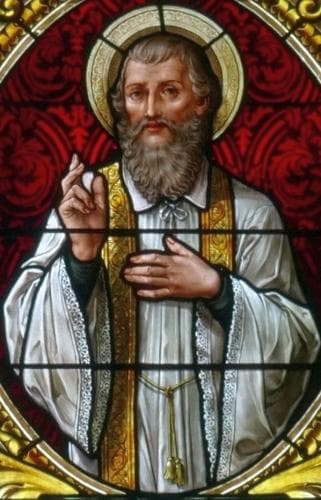Saint Peter Fourier
Saint
Feast Day: December 9
Birth: November 30, 1565
Death: December 9, 1640
Biography
Saint Peter Fourier, also known as the Good Father of Mattaincourt or Le Bon Père de Mattaincourt, was an influential Catholic figure who dedicated his life to education, spiritual renewal, and the reform of religious orders. Born on November 30, 1565, in Mirecourt, Lorraine (modern France), he would go on to become a revered saint, known for his immense contributions to the Catholic Church. Peter Fourier began his educational journey at the University of Pont-a-Mousson, entering at the young age of 15. His exceptional intelligence and enthusiasm for learning were apparent from an early age. After completing his studies, he embarked on a career as a tutor, teaching the sons of various noble families in the region. In 1589, Fourier joined the Augustinian Canon Regular at the abbey in Chaumousey, France, and was ordained as a priest. Following his ordination, he returned to the university and became a master of patristic theology. He possessed an exceptional knowledge of Catholic theology, even memorizing the entirety of the Summa Theologica by Saint Thomas Aquinas. In 1598, Saint Peter Fourier established the Daughters of Our Lady, a religious congregation dedicated to the education of girls. Recognizing the need for reform in the region of Mattaincourt, Vosges, France, known for its corruption and lax attitudes towards heresy, he became a reforming priest there. Through his efforts, he revitalized the spiritual life of the district, inspiring a renewed faith and establishing charitable institutions and banks to aid the poor. During his time in Mattaincourt, Fourier became a spiritual teacher to Blessed Alix le Clerc, mentoring her in her spiritual journey and helping her to found the Congregation of Notre Dame, a religious order dedicated to education. He was also instrumental in the formation of the Sodality of the Immaculate Conception, also known as the Children of Mary, which sought to promote devotion to the Blessed Virgin Mary among the youth. Although his attempts to establish a parallel order focused on educating boys did not succeed, Fourier's impact on the spiritual landscape of Mattaincourt and the surrounding areas was undeniable. His dedication to reforming religious life and fostering a deeper connection to Catholic teachings earned him recognition throughout the Church. In 1621, Saint Peter Fourier was called upon to reform his order in Lorraine. Four years later, he was sent to Salm to preach missions and combat the influences of Calvinism. Remarkably, within six months, he achieved the remarkable feat of persuading all the fallen-away Catholics to return to the Church. In 1629, Fourier played a crucial role in establishing the Congregation of Our Saviour, a religious order with a particular focus on education. By 1632, he was appointed as its superior general, ensuring the implementation of his vision and guiding the congregation towards their mission. However, Saint Peter Fourier faced a significant challenge later in his life. When the French government demanded that he swear allegiance to King Louis XIII, he steadfastly refused, which led to his exile. He spent his remaining years in the town of Gray, Haute-Saone, France, where he continued to provide spiritual guidance and support to the local community. On December 9, 1640, Saint Peter Fourier passed away peacefully in Gray, Haute-Saone, from natural causes. His unwavering commitment to the faith and his tireless efforts to promote education and spiritual renewal earned him both reverence and recognition. Fourier was beatified on January 29, 1730, by Pope Benedict XIII and later canonized as a saint on May 27, 1897, by Pope Leo XIII. Saint Peter Fourier's representation depicts him as a man wearing a rochet, symbolizing his role as a priest, while distributing pictures of the Blessed Virgin Mary and chaplets to children. Although he is not officially recognized as a patron saint of any specific cause, his influence in education, spiritual renewal, and religious reform has had a lasting impact on the Catholic Church and the wider community.
